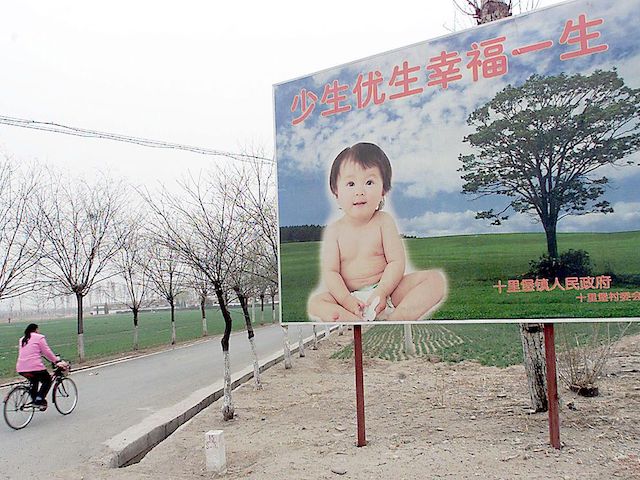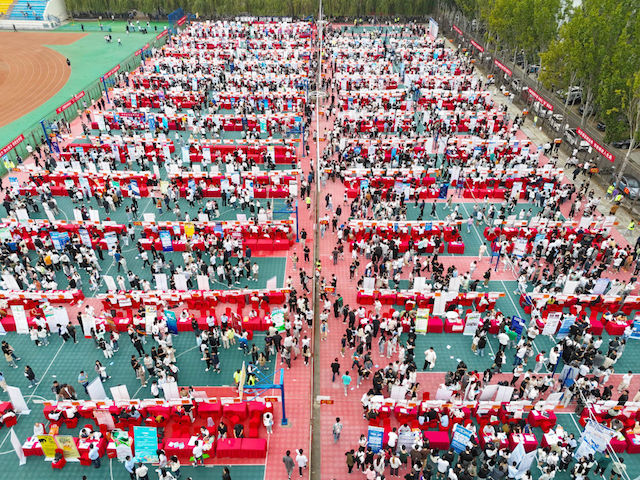The hot new trend in Chinese culture is “full-time children,” young people who have given up looking for jobs as unemployment soars past 21 percent for their demographic and are, instead, paid “salaries” by their families to stay home and take care of their aging parents.
Fox News on Friday noted the emergence of Chinese social media groups devoted to “full-time children,” who fell out of the traditional job market, offer each other emotional support, and even provide “work communications centers” that treat living at home as though it were a skilled profession.
Some of those online groups now have tens of thousands of members, who generally refer to themselves as “full-time sons” or “full-time daughters.”
The full-time children are the third stage of a demographic, cultural, and economic trend among China’s version of Gen Z. The first stage was known as “chicken babies” or “little emperors,” a huge wave of only children produced by China’s horrific One Child Policy of forced abortions.

A woman cycles past a billboard encouraging couples to have only one child, along a road leading to a village in the suburb of Beijing, 25 March 2001 (GOH CHAI HIN/AFP via Getty Images).
Parents doted on these children, who would never have brothers or sisters, and obsessed over preparing them for successful futures. The term “chicken babies” not only evokes mother hens fussing over their eggs, but also an old Chinese folk medicine tradition that claimed injecting young children with chicken blood made them stronger.
The chicken babies were prepped to become a generation of overachievers, marched through afterschool education programs to ensure they would get into good universities and secure top jobs. Education companies that catered to these parental impulses racked up huge profits in the 2000s. One of them, the New Oriental Education and Technology Group, even made it onto the New York Stock Exchange.
This upbringing gave the little emperors and empresses a very unrealistic view of the job market and other adult responsibilities – a phenomenon not unfamiliar to America’s Gen Z but magnified to an even greater degree in China.
One especially destructive quirk is that many of the chicken babies assumed their educational credentials would easily land them cozy sinecures in the vast Chinese bureaucracy, which turned out to be less vast than they thought it was. In 2023, 7.7 million applications were filed for civil service positions in China, but only 200,000 jobs were open.
The chicken babies found fewer private sector jobs than they were expecting as well, especially the comfortable high-tech office positions they were taught to expect. This led to stage two of the cultural meltdown, a youth movement known as “let it rot” (bai lan) or “lying flat” (tang ping), which gained momentum after the Wuhan coronavirus pandemic.
Bai lan was an expression of contempt and rebellion toward Chinese corporate culture, especially the notorious “996” work schedule – working from 9:00 a.m. to 9:00 p.m., six days a week. The Chinese government began to discourage companies from imposing the brutal 996 schedule in 2021, but young people were already rebelling by refusing to look for work. Some saw it as a form of passive protest in an authoritarian collectivist system that would punish them for speaking up but not for lying down.
Tang ping or “lying flat” was originally meant as an insult in Chinese culture, a means of castigating people for being lazy or lacking ambition. It is also employed as a euphemism for incompetent government officials. The chicken babies appropriated the term and said there was no point in having big ambitions when the collapsing Chinese economy would not reward them.
Chinese state media lamented the “let it rot” mindset as a self-defeating attitude, chiding young people for believing in a self-fulfilling prophecy that success was impossible. Some young people saw bai lan as a rebellion that might eventually bring the corrupt, stagnant, and heartless Chinese Communist Party down, accelerating a trend that seems inevitable given China’s doomsday demographics. Others threw up their hands and said there was no point in making long-term plans because the future of their country was so uncertain.
“Lying flat” led directly to “full-time children,” as parents decided it would be better to pay their grown stay-at-home kids a “salary” and treat domestic chores as their jobs, instead of leaving them mired in apathy and despair.
Some observers see the full-time sons and daughters as a somewhat logical response to demographic collapse: the state will not have the income or resources to provide for an aging population, so couples who banked some money during China’s booming expansion years will pay their own children to take care of them.
Some think the “full-time children” arrangement is healthier than indolence and will at least keep China’s youth tuned up and ready for outside employment when and if the job market recovers – but other analysts worry that spending a few years as full-time children will make the chicken babies even worse by giving them even more unrealistic expectations for their lifestyles and employment.
A 21-year-old full-time daughter in China’s central city of Luoyang told CNN in July that she is paid $835 a month to handle tasks such as grocery shopping for her family, which is comparable to the average middle-class wage.
“The reason why I am at home is because I can’t bear the pressure of going to school or work. I don’t want to compete intensely with my peers. So I choose to ‘lie flat’ completely. I don’t necessarily need a higher paid job or a better life,” she said, perfectly capturing the devolution from chicken baby to “let it rot” to full-time child in three crisp sentences.
The full-time children have an interesting attitude of derision toward the generation that came before them, in which ambitious young people who did find decent private jobs or government positions chose, nevertheless, to live at home indefinitely, either because they wanted to save money on rent or because they could not handle domestic chores.
The chicken baby generation refers to the Chinese equivalent of Generation X with the derisive term ken lao zu, which means “those who eat the old” – in other words, parasites. By contrast, full-time children are proud of their ability to handle chores and believe they have earned the salaries their parents pay them.
A full-time daughter in Huangzhou named Zhang Jiayi also became a video blogger, documenting her experiences and offering tips to others who follow the same path. She told Channel News Asia (CNA) in August that working for her parents pays about 20 percent less than her old job selling clothes, but it is much more fulfilling because she spends more time with her family.
“It’s about genuinely enjoying the process of being with your parents and wanting to be there for them,” she said. Like other full-time children who have spoken with Chinese and international media, Zhang insisted she worked hard for her parents and earned every penny of her wages.
Chinese academics who study the full-time child movement told CNA that some of the youths are working for their parents to supplement modest incomes from gig-economy jobs, such as ride-hailing, or because recent college graduates find it less humiliating to work for their families than to take unskilled positions that are far beneath the jobs they expected to get.

College students look for suitable positions at the autumn campus double selection fair of Shandong University of Science and Technology in Qingdao, Shandong province, China, Sept 23, 2023. (Photo by Costfoto/NurPhoto via Getty Images)

Students attend a job fair for graduates at Zhengzhou University on September 22, 2023, in Zhengzhou, Henan Province of China. (Photo by VCG/VCG via Getty Images)
Another interesting quirk pointed out by CNA is that many Chinese families bought urban real estate in the 90s that is now worth a fortune. This has two ramifications: today’s young people cannot dream of affording such homes themselves, so they might as well live in the house their parents already own, and many of them think they will inherit vast sums of money when their elders pass on and sell their property, so working as a full-time child is an easy way to keep money in their pockets until it is time to cash in on that real estate windfall.
The L.A. Times noted that vloggers like Zhang have proven very influential, as a growing number of young people are sold on the full-time child lifestyle – or manage to convince their parents to give it a try – by watching their videos. Some of those videos are racking up millions of views.
“Increasingly, when young people look around, there is almost no one they can rely on except their parents. It’s more complicated than an economic downturn, but the economic downturn is definitely the trigger,” UCLA anthropology professor Yunxiang Yan told the L.A. Times.
“If it becomes a structural problem, then it will have a very important cost in terms of reduced productivity. It may still end up creating a permanent effect because these youth working at home may actually no longer find any other job,” added Asia Pacific chief economist Alicia Garcia-Herrero of French investment bank Natixis.
Garcia-Herrero was alluding to the question on the minds of many observers: will the authoritarian Chinese regime decide that full-time children are a problem and crack down on their lifestyle? It would not be difficult for the gigantic censorship machine in Beijing to shut down all those social media forums and video blogs.
The regime might currently indulge the practice because it keeps youth unemployment from becoming an even bigger political headache, but there is a very good reason Beijing might change its mind: full-time children almost invariably reject the idea of getting married or having kids of their own. The Chinese Communist Party is increasingly worried about population decline and cannot be pleased with tens of thousands of fertile young people embracing a lifestyle that all but guarantees they will not get married or procreate any time soon.

COMMENTS
Please let us know if you're having issues with commenting.